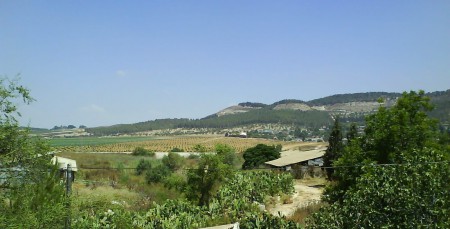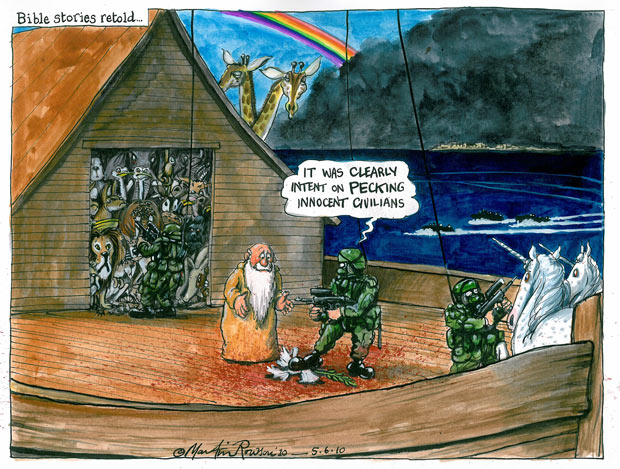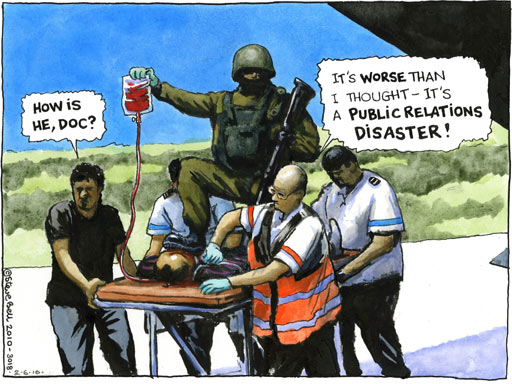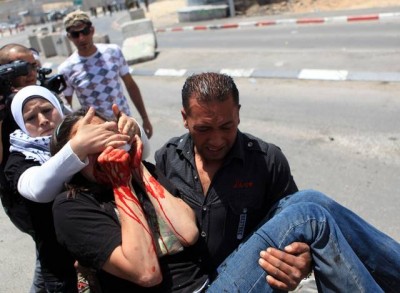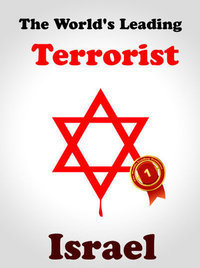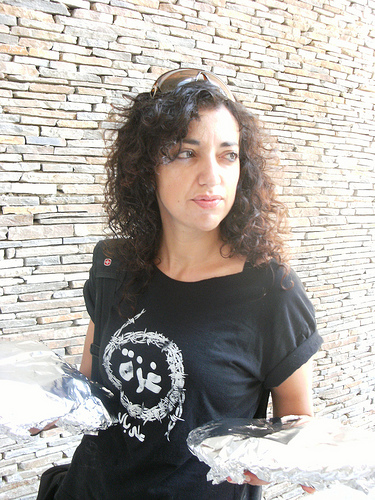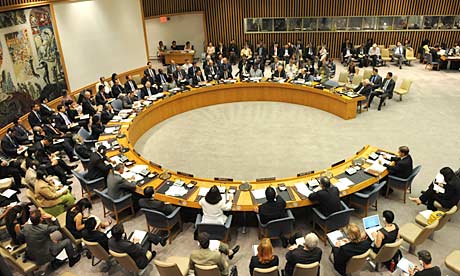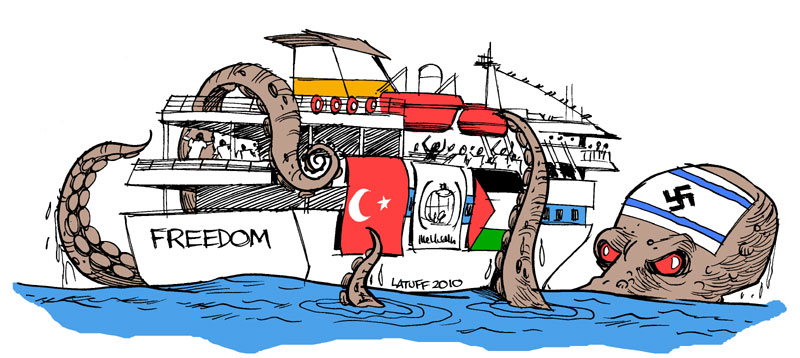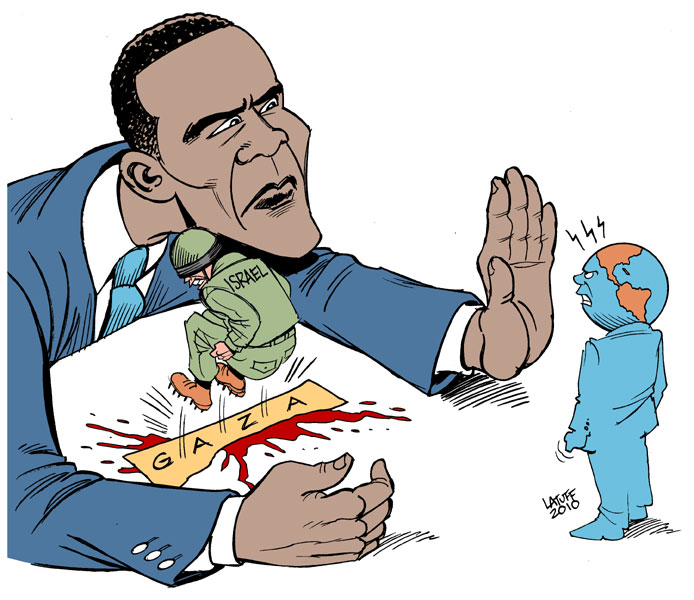
EXCLUSIVE: New Video Smuggled Out from Mavi Marmara of Israel’s Deadly Assault on Gaza Aid Flotilla
In a Democracy Now! exclusive, we bring you a sneak preview of previously unseen raw footage from the Mavi Marmara that will be formally released at a press conference at the United Nations later in the day. The footage shows the mood and the activities onboard the Mavi Marmara in the time leading up to the attack, and the immediate reaction of the passengers during the attack. We are joined by filmmaker and activist Iara Lee, one of the few Americans on the Mavi Marmara ship. Her equipment was confiscated, but she managed to smuggle out an hour’s worth of footage. [includes rush transcript]. This includes very disturbing images, and is another prooof, if proof was needed, of the brutality of Israel and its armed forces.
Democracy Now Video including smuggled images of the massacre
U.S. sources: Turkey vote against Iran sanctions – a slap in the face: Haaretz
State Department spokesman: It will be up to Turkey and Brazil to explain rationale for voting against 4th round of UN sanctions.
Sources close to the American administration told Haaretz on Thursday that the U.S. viewed Turkey’s vote against United Nations Iran sanctions as a slap in the face, in light of the efforts put forth by U.S. President Barack Obama’s administration to enlist global support for the sanctions.
Israel and the United States on Wednesday hailed a UN Security Council vote to impose a fourth round of sanctions on a defiant Iran, which immediately vowed to continue with its nuclear program. Turkey and Brazil were the only votes against the sanctions, while Lebanon abstained.
The 15-nation council passed a resolution that was the product of five months of talks between the United States, Britain, France, Germany, China and Russia. With 12 votes in favor, it received the least support of the four Iran sanctions resolutions adopted since 2006.
U.S. State Department Spokesman Philip Crowley said Wednesday following the vote that “we think coming out of the UN Security Council today is a very strong statement. It was not unanimous. Obviously, it will be up to Turkey and Brazil to explain their votes and their rationale.”
“Clearly, we’ve had disagreements over specific tactics, but we will continue to work with Turkey, Brazil and other countries as we go through implementation of 1929,” Crowley added, referring to Security Council resolution 1929 which increases the cost to Iran’s leadership of their continued defiance of the international community, and aims to persuade Iran that it is in its interest to peacefully resolve concerns about its nuclear program.
Abbas say faith in two-state solution ‘eroding’: BBC
Page last updated at 18:49 GMT, Thursday, 10 June 2010 19:49 UK
Mr Abbas is holding talks with senior US figures during his visit
Lack of progress in the Mid-East peace process is “beginning to erode” faith that a two-state solution is possible, Palestinian leader Mahmoud Abbas said.
Mr Abbas also told a Washington think-tank that the Palestinians’ main demand was to end the blockade of Gaza.
Israel is under strong international pressure following a deadly raid on ships trying to break the blockade.
Mr Abbas has been on a visit to Washington which has included talks with President Barack Obama.
“I would like to express some concern that the situation is extremely difficult,” Mr Abbas told the Brookings Institution.
“The hope for a two-state solution, Palestine… living side-by-side in peace with the state of Israel, this concept is starting to erode and I fear that the world is starting to distrust that we are able to reach this solution.”
‘End blockade’
Mr Abbas described Israel’s “attack” on the aid convoy in international waters as “unlawful, unacceptable”.
“Our main demand is how to end the blockade on Gaza and I believe the entire world stands with us,” he said.
The Israeli raid has sparked wordwide protests
Mr Abbas is due to hold more talks with senior US officials on Thursday, including White House National Security Adviser James Jones.
On Friday he is due to meet US Secretary of State Hillary Clinton before returning to the Middle East.
After Wednesday’s meeting at the White House, Mr Obama said the situation in Gaza was “unsustainable” and promised $400m (£274m) in new aid for the territory.
But he urged both Israel and the Palestinians to make concessions and return to stalled peace talks.
“Not only is the status quo with respect to Gaza unsustainable, but the status quo with respect to the Middle East is unsustainable,” he said.
“It is time for us to go ahead, move forward on a two-state solution.”
Israel says its blockade of Gaza is needed to deter attacks by militants from the Hamas movement, which runs the territory.
Nine activists died when Israeli commandos stormed a Turkish passenger ship which was part of an aid flotilla heading for Gaza on 31 May.
In another development on Thursday, the Palestinian Authority postponed local elections due to be held in the West Bank next month.
No reason was given for the decision, made during a cabinet meeting in Ramallah.
Hamas had already said it would boycott the vote.
Spain seeks EU backing on plan to lift Israeli blockade of Gaza: The Guardian
EU scrambles for policy response after international outrage over Mavi Marmara
Spain is drawing up new proposals for lifting Israel’s blockade of the Gaza Strip as the EU scrambles to forge an effective policy following international outrage over the killing of nine pro-Palestinian Turkish activists in a “freedom flotilla”.
Miguel Moratinos, the Spanish foreign minister, is to present Madrid’s ideas to EU colleagues next Monday amid signs of disagreement between member states and demands for tougher action.
The US, Britain and the EU have all called the blockade “unsustainable”. But Britain is warning of exaggerated expectations of what can be achieved. “I don’t think the British government is talking about lifting the blockade,” said the Foreign Office minister for the Middle East, Alistair Burt. “Everything is done with relatively small incremental steps. Almost any change is potentially a change for the better.”
British officials stress the importance of Israel improving access conditions for 1.5m Palestinians by publishing a blacklist of banned goods and not simply stating which ones are permitted. “That would be a fundamental shift which would enormously benefit Gaza,” said one.
Israel has rejected a French idea that EU forces would check the cargoes of ships heading for Gaza to ensure they are not carrying goods Israel would consider a security risk. Bernard Kouchner, France’s foreign minister, called the response from Jerusalem “rather negative”. Spain, chairing the EU’s rotating presidency, will be expected to work with Lady Ashton, the union’s foreign policy chief, diplomats said. Another idea is the revival of the EU Border Assistance Mission at the Rafah crossing point into Egypt. Its operations were suspended in 2007 after the takeover of Gaza by the Islamist movement Hamas, shunned by Israel and the west.
“We are seeing a sense of disarray with several voices speaking at the same time,” said Clara O’Donnell of the Centre for European Reform. “But even if the EU is keen to help, the Israelis do not consider it reliable enough. There is not much Europe can do until the Americans move.”
But Lord Patten, Britain’s former EU external affairs commissioner, today urges the EU to demand an immediate end to the blockade, open dialogue with Hamas, and not let the US monopolise policy.
“Today’s miserable and brutal stand-off in the Middle East requires new political initiatives,” he writes in the Guardian. “The EU is Israel’s biggest trade partner and the largest provider of development assistance to Palestine yet it has been content to play a largely very quiet third fiddle to the US. It is true that the US has the primary external role in the region, and that any peace settlement will require Israel’s willing agreement. But none of this justifies the EU’s present nervous self-effacement. This policy gives Israel carte blanche. It makes Europe complicit in outrageous and illegal acts.” Patten calls for the UN to be tasked with preventing weapons entering Gaza while the EU should take the initiative with Turkey and the Arab League to re-establish a national unity government of Fatah and Hamas for the West Bank and Gaza. Britain says it has no plans to end its ban, backed by the Quartet, on contact with Hamas.
